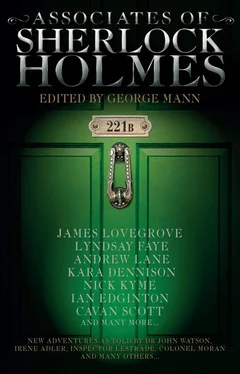At this point in my narrative Mr Holmes asked, “Might this nocturnal excursion have only been a dream, Miss Stoner? For I am sorry to report that your visitor Edward Thurn is no longer among the living.”
“What’s this, Holmes?” Dr Watson said, quite surprised.
“Really, Watson,” Mr Holmes said to him, “you must pay closer attention to the morning paper.” Here he gestured to a folded copy of that morning’s Daily Telegraph that rested nearby. “I knew the name as soon as you uttered it, Miss Stoner, but I wanted to hear your story in full before I admitted as much. Yet I suspect you are already aware of the man’s fate, for you have just now come from the place where he had taken a room in Upper Swandam Lane, have you not?”
“You guess correctly, Mr Holmes,” said I.
“I do not guess, Miss Stoner. I deduce. Your breathlessness when you entered this room and your agitated comportment indicated a very recent shock.”
“I did not realise his death had already been reported in the paper. This morning when I inquired about Mr Thurn at the address given on the letter he had sent to my stepfather I was told there had been a terrifying cry from his room at about three in the morning, and when the door was finally forced Mr Thurn was found lying dead on the bed, his eyes staring fixedly into nothingness. It was the opinion of those who saw him that his heart had given out.”
“The cause given in the paper was apoplexy,” Mr Holmes stated. “But surely you see the dilemma here, Miss Stoner. The body of the obscure explorer and world traveller Edward Thurn was discovered at three in the morning, but you claim to have seen him standing in your very home at approximately half past two. It is impossible for him to have arrived back in London in so short a time.”
“Precisely, Mr Holmes. It would be an impossibility under natural circumstances.”
“Then I will propose supernatural circumstances, in keeping with your account. That it was not actually Mr Thurn you saw, but some projected essence of himself that he sent to deal with that other phantom being.”
“Make of it what you will, Mr Holmes. It is all beyond me.”
He clicked his pipe stem against his teeth, then pondered aloud, “Of course there is no such thing as a swamp adder. What was I thinking?”
“With all respect to Miss Stoner, whose own trustworthiness I do not doubt,” Dr Watson said to his friend, “if one were to entertain for even a moment such outrageous notions, surely a man as hateful as Grimesby Roylott would not be capable of the mental feats this Thurn fellow claimed were required for their collaboration.”
Lowering his pipe, Mr Holmes replied, “But Roylott was, in some ways, well suited to such an exercise, being that he felt he answered to no man or God, and that his mental acuity entitled him to power. There is no richer soil for the growth of evil than the supposition that one is superior to one’s fellow human beings. Mind, there are those who, being cognisant of their greater-than-average intelligence, will utilise it for the betterment of others as if it were a resource they had received in unfair quantity. But too many hoard their intelligence, and allow it to deform their self-conception into something superhuman, when in fact ‘inhuman’ would be the better designation. Unfortunately, Roylott was not a singular specimen; this world teems with his ilk.”
“True enough,” said Dr Watson. “But all that aside, you are the most rational of men, and surely you cannot believe in ghosts and hobgoblins.”
“There are more things in heaven and earth, Watson, than are dreamt of in my philosophy. There is only one matter I am certain of.”
“And what is that, Holmes?”
“One day, truly, I must travel to Tibet.”
I rose from my chair so as to excuse myself, saying, “I am meeting my fiancé soon, Mr Holmes, so I will take my leave. Perhaps, as you muse upon the events I have recounted, you will come to some other explanation that escapes me, and if so I hope you will share it with me. Until that time, I extend to you the same invitation I did to poor Mr Thurn, who I fear may not only have died from the strain of battling his final monster, but may even have hoped to do so, to atone for the sins he felt he had committed.”
“You are offering me your stepfather’s books, then?” enquired Holmes. “It is kind of you, and, as you mentioned there were some of an esoteric nature, I wonder if they might shed further light on these mysterious events, but I suggest that despite your reluctance to retain any of your stepfather’s belongings you keep them and read them yourself, Miss Stoner. You have a sharp and inquisitive mind, and perhaps it is you who will one day better explain to me what transpired at Stoke Moran. And, might I say, I hope your next home proves less haunted.”
I reached my hand to the sitting room door. “I repeat that my only hope is to soon put Stoke Moran behind me once and for all. A good day to you, gentlemen.”
A FAMILY RESEMBLANCE
Simon Bucher-Jones
Mycroft Holmes, Sherlock’s older, and perhaps smarter, brother was introduced to the canon in “The Adventure of the Greek Interpreter” ( The Strand , 1893, thereafter, The Memoirs of Sherlock Holmes ). It has long been a regret of mine that no meeting between Mycroft and Professor Moriarty had come to light, and, while this story only supplies this at, as it were, one remove, I trust that this meeting of brothers throws light on the characters and on their respective siblings.
—Simon Bucher-Jones
Being an account extracted from the Papers of Mycroft Holmes, released under the sixty-year rule and subject to such elisions as have been deemed necessary for National Security. Mycroft appears to have had a near-perfect memory, but he augmented – and perhaps to a degree even produced – this effect, in practice, by writing memoranda of his day’s activity each night including a verbatim account of his conversations.
A CONVERSATION AT THE DIOGENES CLUB
There have been some interesting, though somewhat juvenile to my way of thinking, monographs out of Vienna in the last year [1] This appears to refer to the three papers published in the first half of 1896 by Sigmund Freud.
– which speak to the central problem of humanity – that is, why it is so difficult for a rational man to deal with those who merely regard themselves as rational.
Take my brother for example. There will be, I am sure, as our knowledge of the mind and body develop beyond that of Aristotle and the Edinburgh school of dissection-inclined materialists, a specific diagnosis that defines a man who oscillates between frantic activity and reptilian inaction. If the late Robert Louis Stevenson [2] The papers of the late Mycroft Holmes from which this account is derived do not date events. They were originally filed in an order that would have made their timing self evident to their maker. Sadly this arrangement was lost in the Blitz, when some of the papers were destroyed and all were scattered. Robert Louis Stevenson died on 3rd December 1894; this, and the earlier reference to Freud suggests that this account dates from 1897 at the earliest.
had been more astute, he might have determined that the divide in man was not good and evil, but energy and lethargy, or extroversion and introspection. An introspective evil is more akin to an introspective good than it is unlike it, and an active force in the world, whether for good or evil, must move in similar ways albeit to different aims.
A rational being, as Hume might define one, [3] Mycroft is perhaps here referring to the definition of rational as opposed to superstitious in Hume’s Of Suicide unpublished in the philosopher’s lifetime except as an anonymous private pamphlet.
determines the modes in which his brain best functions and, having so determined, constructs a mechanism to permit the world to encroach upon that functioning as little as possible, as is commensurate with making a rational supportive contribution to the maintaining of that mechanism. We pay a debt to society, in so much and so far as society is necessary for us, either as a value in itself, or as a means to permit our protection from mere anarchy or worse. Where the mechanism forms a join with the irrational world it may become partly irrational, but that contact should be limited so as to prevent such contamination.
Читать дальше












